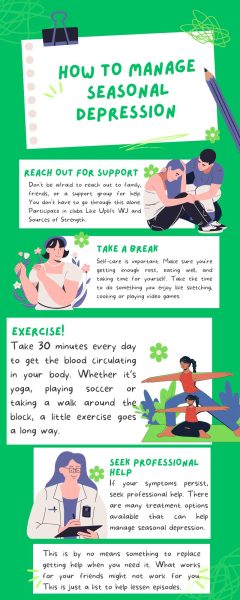
Winter is a heavily romanticized season, with all the holiday songs singing about glistening snow and how “It’s a marshmallow world in the winter.” Kids and adults walk with cups of hot chocolate and kids show off the holiday presents “Santa” brought them. But with all the festivities and holiday spirit, it’s often overlooked how the shortened daytime affects people.
Every year, we change the clocks back an hour the first Sunday of November. and bring the hour back on the second Sunday of March. This tradition started in 1918, during World War I, to conserve power and fuel and has continued because it proved to reduce energy bills. However, as proven by a Johns Hopkins Medicine article titled “Seasonal Affective Disorder,” the lack of sunlight during the winter causes seasonal depression. There’s nothing we can do about daylight savings or the days getting shorter, but there is something we can do to give ourselves a chance to feel better.
The sun is going down a lot earlier during the winter, so it’s important to take advantage of it while it’s still up. Taking a walk, no matter the length, provides a well-needed break from school and general tasks. Physical activity in general boosts endorphins, the chemical that creates a general feeling of well-being. Being in the sun, even on a cloudy day, regulates the production of serotonin (mood regulation) and melatonin (a hormone that affects sleep), both of which are disrupted by seasonal depression. Dogs, friends and family are all great partners for walks, or music if you want to be alone.
Whether it’s going to the gym or playing indoor soccer with a group of friends, working off excess energy is important. Between school and homework, students sit for an average of seven and a half hours a day. It’s easy to forget to move when there doesn’t seem to be a reason to. COVID-19 popularised at-home workouts that can be found on YouTube, along with dance workouts with different levels to follow along with. There’s something for everyone to enjoy.
Being around friends and family is also really important. While it’s important to study and finish work for classes, it’s also important to have a social life. Being around people makes it a lot easier to get through something like seasonal depression. There are many clubs at school that were made to help students overcome obstacles like this, such as Sources of Strength, Uplift WJ and Mindset Matters Club. Go to a club meeting during lunch, talk to your counselors or any other trusted adult.
Winter can feel isolating and draining, but it’s important to remember that you’re not alone. Seasonal depression is real, but it’s also manageable with support. Exercise, socializing and exposure to natural light can go a long way. This includes regular sleep patterns, healthy eating habits and setting aside time each day for activities that bring joy, whether that’s reading, creating art, or relaxing with a favorite show. Don’t forget to take a breather, get centered and take the time you need to stay on top of assignments.








